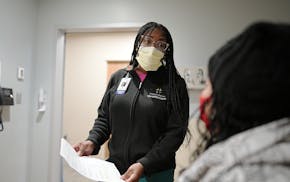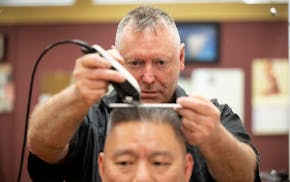Arc Greater Twin Cities CEO Kim Keprios was pleased last week as she shopped her company's just-opened store at the Valley West Shopping Center in Bloomington.
The registers were ringing up steady sales of clothing, household goods and holiday merchandise.
Her board's commitment in the throes of the Great Recession to raise and invest what became $4.5 million, mostly to remodel and expand the Arc's retail network, is paying off with 7 percent annualized sales growth.
"It was a business risk," acknowledged Keprios. "But our team is very creative and we always aim higher."
And there is purpose beyond a sale.
Keprios has three decades of leadership experience with Arc, the nonprofit that advocates for and assists people with intellectual and developmental disabilities, their families and caregivers.
"We knew that the Arc Value Village Thrift Stores had to be more of a [revenue] cornerstone, a living endowment," Keprios said.
Since 2009, three stores have been overhauled and two have opened in suburban spaces once occupied by retailers that retrenched.
Net revenue from Arc's five stores, after operating expenses, contributes a growing percentage that this year should top half of its $4 million-plus in net revenue and contributions. Retail profits are the No. 1 contributor to Arc's budget, followed by individual and corporate donations. United Way and government support have receded to about 10 percent.
Arc is a so-called "social enterprise," a nonprofit business that funds itself partly with operations to feed the "triple-bottom line" of its mission, employing people and helping the environment by reusing or recycling millions of tons of goods annually. And used-good retailing, including Goodwill and Hope Chest stores, has lost its dingy-store stigma. Value Village stores are bright, clean and well-stocked. And reuse is hip.
"Ten years ago we talked a little about being 'green,' " Keprios said. "Now it drives some people to shop here. And they are proud to talk about great deals."
Arc grossed about $7 million last year from retail operations, selling 3 million items of used clothing and other merchandise. It donated to overseas missions or sold to recyclers 3 million pounds of goods. The retail business is also a beacon of Arc's mission.
More than 10 percent of Arc's 250 store workers are people with disabilities. They make $8 to $12 an hour like the other floor employees.
"We are here also to demonstrate to the employer community that people with developmental disabilities can be committed and valuable employees," said Laurel Hansen, Arc's longtime retail director.
Arc also boasts 250,000 merchandise donors annually and thousands of volunteers, from school groups to families, who benefit from its services.
Keprios, 57, is rooted in Arc's mission. Older brother Mike, 59, was born without eyes and with an intellectual disability. In those days, many people with disabilities were sent to institutions. Keprios' parents, a teacher at Minneapolis Roosevelt High School and a homemaker, raised Mike with the four other kids. He was the light of the family. Mike, now retired from a job, still is an Arc store volunteer along with their mother, Dodie, 83.
Keprios financed her University of Minnesota degree working weekend shifts at a group home. She showed up at Arc on her bike one day in 1982 and was hired to run a camp for clients and families. In 1986, the board hired her as the $32,500 executive director of the then-four person organization with a $350,000 budget. In 1991, Keprios spun off Arc's camp to a nonprofit camping organization to focus on expanding retail. Keprios shut down a dingy, tiny reuse store in Richfield and expanded to larger spaces in Richfield, New Hope and Brooklyn Center.
Today, Keprios is paid about $185,000 to run an organization of 300 employees, from family counselors and advocates to personal shoppers who help people mix and match outfits. Arc at the Legislature last session helped get 5 percent raises for long-frozen attendants who care for the disabled. It works with lawmakers, school districts and businesses on policy and practices.
"Our goal is to have families and self-advocates share their stories and highlight what [government programs] work and don't work," Keprios said.
Keprios, who laughs a lot, works 60 hours a week. And she also leads the growing contingent at Arc's winter fundraising gala who wear $12.99 gowns or $25 used suits from Value Village stores. They display the price tags proudly.
"She runs two businesses, advocacy and thrift stores," said Twin Cities business lawyer Tom Judd, whom Keprios recruited to the Arc Twin Cities board 20 years ago. "At the heart of this whole thing is her passion for people with disabilities. I didn't have a passion when I started in 1995. I was open to helping the disability community. They are doing better, thanks to Arc. I've not met a person within Arc who doesn't share her passion."
John W. Kelly, an Arc board member and senior vice president at UnitedHealth Group, said he will never forget the Arc advocate who helped him and his wife with an education issue at their son's school. He has severe autism. Kelly's wife became an Arc Thrift shopper, donor, and they became financial contributors.
Before he knew it, Keprios had recruited Kelly to the board. And he oversaw the $4.5 million capital campaign.
"She's a smart woman, a good leader," Kelly said. "I've done a lot of what I've done because of her passion, emotion and positive attitude."
Said Keprios: "Arc is just part of my DNA. It's difficult to separate it from my personal life."
Neal St. Anthony • 612-673-7144 • neal.st.anthony@startribune.com

St. Anthony: 'Patient' investing paying off for St. Paul's Hill Capital

Jennifer Smith, leader of Burnsville's Innovative Office Solutions, has died

St. Anthony: Medical professions in Minnesota need more people of color in their ranks


